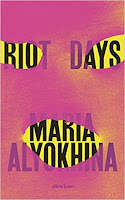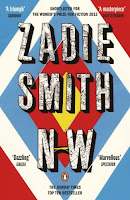Happy Christmas! Here are plenty of recommendations to see you into the New Year, and another chance to thank our excellent contributors for making this blog so full and varied. Do tell us in the comments what you've most enjoyed this year.
 I'd like to recommend Riverkeep by Martin Stewart. It's innovative,
I'd like to recommend Riverkeep by Martin Stewart. It's innovative,evocative and thrilling, full of strange, interesting ideas and characters, a coming-of-age quest fantasy novel that kept me reading all night long.
Another recommendation would be To The Bright Edge of the World by Eowin Ivey, also a river quest. The title has a double meaning - the story is set in Alaska, and is about exploration and photography, as well as about human endurance and love. Written in several voices as logs, letters and diary entries, it is completely involving.
CATHERINE JOHNSON:
Why I'm No Longer Talking to White People About Race, by Reni Eddo-Lodge. Thank God for young people! For many of us, light skinned enough to pass, and/or brought up in a time when we had to be grateful for everything and not shout too loud and also remember to work three times as hard as anyone else (you're not white, you're a woman x2) Eddo-Lodge's book is a breath of fresh air. Read it and understand better how structural racism impacts on all of us.
The Girls by Emma Cline is a not entirely perfect first novel, but a great read which I loved for that absolutely pitch-perfect portrayal of what being 14 feels like. On the edge of a world you don't understand but want to rush headlong into, without understanding anything. That intensity of feeling and that impatience to be someone else. It's so worth your time.
ANTHONY McGOWAN:

Keeping On Keeping On, the latest volume of Alan Bennett’s diaries and other prose. I find Bennett endlessly funny and moving. The book is enormous, but I read it in a couple of days, constantly struck by the perfection of the writing. In some ways The Art of Failing is my attempt to ‘do’ Alan Bennett.
Richard Beard’s The Day That Went Missing, tells an impossibly sad, indeed tragic, story of family loss, in prose of restrained elegance.
It took me almost a year to finish Peter Frankopan’s magisterial The Silk Roads, but now my head is crammed with unforgettable facts, and I’ll never again think of Western Europe as being the centre of the world. To read the book is to look East, with wonder and admiration.
MIRIAM MOSS:
My Name is Leon by Kit de Waal. Shortlisted for the Costa First Novel prize, this is a powerful, authentic story about a boy desperate to reunite his broken family.
Cove by Cynan Jones (Catapult) is a minimalist story (just 100 pages) of an injured man adrift at sea. Lyrical, visceral and intense.
YVONNE COPPARD:
 City of the Mind by Penelope Lively. Architect Matthew Holland is involved in the major reconstruction of the London Docklands. The blend of past and present his work evokes is reflected in his own emotional landscape as he journeys away from loss and loneliness towards a more hopeful future.I read this again for the umpteenth time this year and am still enchanted by the poetic quality of Penelope Lively’s writing and the seamless, circular nature of nature of Time that it evokes.
City of the Mind by Penelope Lively. Architect Matthew Holland is involved in the major reconstruction of the London Docklands. The blend of past and present his work evokes is reflected in his own emotional landscape as he journeys away from loss and loneliness towards a more hopeful future.I read this again for the umpteenth time this year and am still enchanted by the poetic quality of Penelope Lively’s writing and the seamless, circular nature of nature of Time that it evokes.
On holiday in Norfolk earlier this year I fell in love with the coastline and seascape, and came across a series of books that captures all that and also introduces you to a lovely band of friends. They’re by Elly Griffiths: the first is called At the Crossing Places and they are sort-of detective stories - but the people and place are far more important than the crimes. Wonderful.
MICHELLE LOVRIC:
Amanda Craig’s brilliant The Lie of the Land and Max Porter’s dazzling Grief Is the Thing with Feathers; then there's Lincoln in the Bardo, which I’ve just finished, but I fear that to define this novel for others might well be to corrupt the unusual experience of reading it.
The same goes for The Underground Railway (Colson Whitehead) one of my most admired books of this year and Sandra Newman’s The Country of Ice Cream Star, one of my most admired books of any year.
JANE HARRIS:
 The Bone Readers by Jacob Ross is a piece of crime fiction set on the Caribbean island of Camaho - a fictionalised version of Grenada. A beautifully-written, suspenseful tale.
The Bone Readers by Jacob Ross is a piece of crime fiction set on the Caribbean island of Camaho - a fictionalised version of Grenada. A beautifully-written, suspenseful tale.The Wife, by Meg Wolitzer, is a clever and witty novel about a woman who helps her writer husband build a successful career, while neglecting her own ambitions.
CINDY JEFFERIES:
 The Tenderness of Wolves by Stef Penney. Wow! What a great winter novel! Frozen lakes, all kinds of snow, and a beautifully told story from several points of view. Moving, tense and with some very diverse characters drawn along the same, masterfully created plot. No wonder if was the 2006 Costa book of the year. Best read curled up in front of a warm fire with the wind howling outside and a glass of something delicious to hand.
The Tenderness of Wolves by Stef Penney. Wow! What a great winter novel! Frozen lakes, all kinds of snow, and a beautifully told story from several points of view. Moving, tense and with some very diverse characters drawn along the same, masterfully created plot. No wonder if was the 2006 Costa book of the year. Best read curled up in front of a warm fire with the wind howling outside and a glass of something delicious to hand.Masters of Atlantis by Charles Portis is a delicious satire of surpassing invention, dotty literalism, dry comedy. Portis has the understated shifts of a cunning artist of deft insult. The effect of his comedy is like a slap on the pate with a fish slice, a gliding insertion of the narrow blade, a raised eyebrow before the incredulous sigh.
In her startling book Riot Days, Maria Alyokhina, of Pussy Riot, writes of her brutal time in prison: ‘I would like to live my life in such a way that whatever I leave behind has something to do with freedom and truth and not with the emptiness that these words become as I speak them.’ Reading such a testament of courage and self-knowledge, of withering examination of the cruder instincts of humanity, oppressed by cold, hunger, a brutal regime, absurd regulation, makes me feel inadequate.
CELIA REES:
The Lost Words… I’m simply lost for words, superlatives, anyway. Outstanding book of this year, or any year. Beautiful and profound - everyone should experience it.
My other book would be The Brontë Cabinet: Three Lives in Nine Objects by Deborah Lutz, which is a must for all fans of the Yorkshire siblings. From Emily’s writing desk to Branwell’s walking stick, Deborah Lutz manages to bring fresh, new perspectives to the much trammelled world of the Brontës by viewing their lives through their possessions.
LINDA NEWBERY:

Like Alan Hollinghurst's previous novel, The Stranger's Child, The Sparsholt Affair spans several generations, from Oxford in the Blitz, through the London art world in the seventies and eighties, to the present. It teases us with the affair of the title, which occurs off-page and is never fully explained, though significant to several of the characters. There's an elegant sense of place, period detail and the nuances of behaviour, as you'd expect from Booker-winner Hollinghurst, and a pervading sense of the difficulty of knowing other people.
I also loved Dan Pearson's Natural Selection, (reviewed here on publication in May) - a bringing together of pieces he wrote for the Observer as its weekly garden columnist. Pearson is both an influential garden designer and an accomplished writer, sensitive to place, season, weather and shifts of light. Since hearing him speak at the Oxford Festival this spring I've been enjoying the Saturday treat of his weekly blog, Dig Delve.
ADĒLE GERAS:
Life in the Garden by Penelope Lively. Although I'm not a gardener, I love visiting gardens and also reading and writing about them. I've been a fan of Penelope Lively's work for both adults and children since the seventies, so this is a perfect book: a beautiful, velvet-to-the-touch hardback full of Lively's characteristic good sense and imagination.
Devil's Day by Andrew Michael Hurley. I loved Hurley's first novel, The Loney, and I think that this is even better. I've named this genre SOGGY RURAL NOIR and this is a prime example. No other book has made me more grateful for my suburban comforts! It has a touch of spookiness about it and is wonderfully involving throughout.








































































